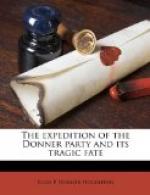[Illustration: GOLD ROCKER, WASHING PAN AND GOLD BORER]
[Illustration: SCENE DURING THE RUSH TO THE GOLD MINES FROM SAN FRANCISCO IN 1848]
Before the season was half over, heavy rain was followed by such bitter cold that all the ground and still waters were frozen stiff. Although we were well muffled, and grandma warmed us up with a drink of hot water and sweetened cream before starting us out after the cows, the frost nipped at our feet until the old scars became so angry and painful that we could scarcely hobble about the house. Many remedies were tried, to no purpose, the most severe being the early foot bath with floats of ice in the water. It chilled us through and through, and also made grandma keep us from the fire, lest the heat should undo the benefit expected from the cold. So, while we sat with shivering forms and chattering teeth looking across the room at the blazing logs under the breakfast pots and kettles, our string of cows was coming home in care of a new driver.
We were glad to be together, even in misery, and all things considered, were perhaps as useful in our crippled condition as before, for there was enough to keep our hands busy while our feet rested. Grandma thought she made our work lighter by bringing it to us, yet she came too often for it to seem easy to us.
First, the six brass candlesticks, with hoods, snuffers, and trays had to be brightened; and next, there were the small brass kettles in which she boiled the milk for coffee, to be polished inside and out. However, we did not dread the kettles much, unless burned, for there was always a spoon in the bottom to help to gather the scrapings, of which we were very fond.
But when she would come with a large pan of dried beans or peas to be picked over quickly, so that she could get them soaked for early cooking, we would measure its contents with critical eyes to make sure that it was not more than we had had the previous day. By the time we would get to the bottom of the pan, she would be ready to put before us a discouraging pile of iron knives, forks, and pewter spoons to scour with wood ashes. How we did hate those old black knives and forks! She said her sight was poor—but she could always see when we slighted any.
The redeeming work of the day was sorting the dried fruit for sauce or pies. We could take little nibbles as we handled it, and knew that we should get an extra taste when it was ready for use. And after she had put the upper crust on the pies, she would generally permit us to make the fancy print around the edges with a fork, and then prick a figure in the centre to let the steam escape while baking.
Sometimes she received a dollar apiece for these pies; and she had so many customers for them and for such loaves of bread as she could spare, that she often declared the farm was as good as a gold mine.
We were supposed not to play with dolls, consequently we durst not ask any one to step around and see how our little house in the back yard was weathering the storms, nor how the beloved nine in it were getting along. Though only bottles of different sizes, to us they were dear children, named after great personages whom the soldiers had taught us to honor.




